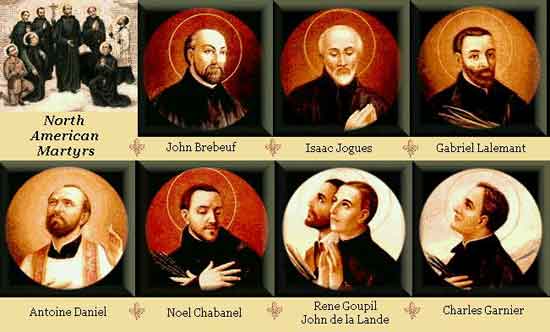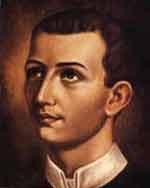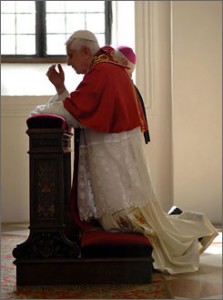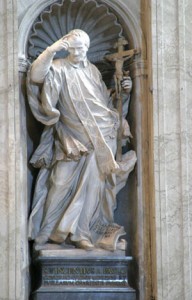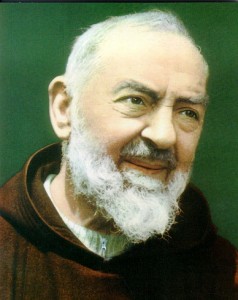Blessed John Paul II reflection on the NMA:
The North American Martyrs, then, gave up their lives for the sake of the Gospel – in order to bring the faith to the native people whom they served. In fact, we are told that their faith was so strong that they yearned and prayed for the grace of martyrdom. Let us recall for a moment these heroic saints who are honoured in this place and who have left us a precious heritage.
Six of them were Jesuit priests from France: Jean de Brébeuf, Isaac Jogues, Gabriel Lalemant, Antoine Daniel, Charles Garnier and Noël Chabanel. Fired with love for Christ and inspired by Saint Ignatius of Loyola, Saint Francis Xavier and other great saints of the Society of Jesus, these priests came to the New World to proclaim the Gospel of Jesus Christ to the native peoples of this land. And they persevered to the end despite difficulties of every sort.
Two lay brothers were part of the missionary group: René Goupil and Jean de la Lande. With no less courage and fervour, they assisted the priests in their labours, showed great compassion and care for the Indians, and, laying down their lives, won for themselves the martyr’s crown.
And as these missionaries laid down their lives, they looked forward to a day when the native people would enjoy full maturity and exercise leadership in their Church. St. John de Brébeuf dreamed of a Church fully Catholic and fully Huron as well.
…
And today we are grateful for the part that the native peoples play, not only in the multicultural fabric of Canadian society, but in the life of the Catholic Church. Christ himself is incarnate in his Body, the Church. And through her action, the Church desires to assist all people “to bring forth from their own living tradition original expressions of Christian life, celebration and thought” (Ioannis Pauli PP. II, Catchesi Tradendae, 53).
Thus the one faith is expressed in different ways. There can be no question of adulterating the word of God or of emptying the Cross of its power, but rather of Christ animating the very centre of all culture. Thus, not only is Christianity relevant to the Indian people, but Christ, in the members of his Body, is himself Indian.
And the revival of Indian culture will be a revival of those true values which they have inherited and which are purified and ennobled by the Revelation of Jesus Christ. Through his Gospel Christ confirms the native peoples in their belief in God, their awareness of his presence, their ability to discover him in creation, their dependence on him, their desire to worship him, their sense of gratitude for the land, their responsible stewardship of the earth, their reverence for all his great works, their respect for their elders. The world needs to see these values – and so many more that they possess – pursued in the life of the community and made incarnate in a whole people.
Finally, it is in the Eucharistic sacrifice that Christ, joined with his members, offers up to his Father all that makes up their lives and cultures. In his Sacrifice he consolidates all his people in the unity of his Church and calls us all to reconciliation and peace.
As we go forward, let us commend ourselves to the intercession of the North American Martyrs, to Blessed Kateri Tekakwitha, Saint Joseph, Patron of Canada, and all the Saints, together with Mary the Queen of Saints. And in union with the whole Church – in the richness of her diversity and in the power of her unity – let us all proclaim by the witness of our own lives that “neither death nor life… nor any created thing, can ever come between us and the love of God made visible in Christ Jesus our Lord” (Rom. 8, 38-39).
Tags: catholic, catholic church, catholic podcast, catholic prayer, cathollc spirituality, jesuits, martyr, martyrdom, native peoples, The North American Martyrs
This entry was posted on Wednesday, October 19th, 2011 at 10:12 am
You can follow any responses to this entry through the RSS 2.0 feed.
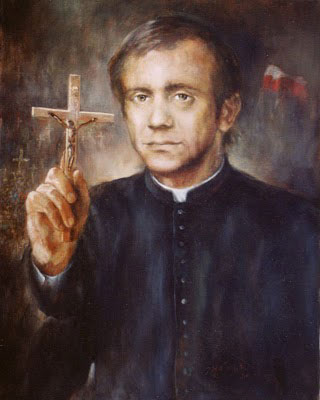 From Pope Benedict XVI, an excerpt
From Pope Benedict XVI, an excerpt
Another figure I wish to remember: Fr Jerzy Popiełuszko, a priest and martyr who was proclaimed Blessed in Warsaw precisely last Sunday. He exercised his generous and courageous ministry beside all those who were working for freedom, for the defence of life and for its dignity. His work at the service of goodness and truth was a sign of contradiction for the regime governing Poland at the time. Love of the Heart of Christ led him to give his life and his witness was the seed of a new springtime in the Church and in society. If we look at history, we can note how many pages of authentic spiritual and social renewal were written with the crucial contribution of Catholic priests, motivated solely by passion for the Gospel and for human beings and for their true freedom, both religious and civil. How many initiatives of integral human promotion have been born from the intuition of a priestly heart!
Dear brothers and sisters, let us entrust all the priests in the world to the Immaculate Heart of Mary, whose liturgical Memorial we celebrated yesterday, so that they may continue with the power of the Gospel to build everywhere the civilization of love.
Tags: Blessed Jerzy Popieluszko, catholic, catholic podcast, catholic prayer, cathollc spirituality, martyr, martyrdom, pope benedict xvi
This entry was posted on Wednesday, October 19th, 2011 at 7:47 am
You can follow any responses to this entry through the RSS 2.0 feed.
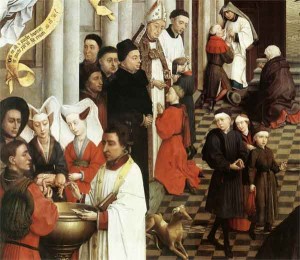 This video shows a very brief overview of the Seven Sacraments of the Christian, Catholic Church. From these sign we receive the graces of salvation.
This video shows a very brief overview of the Seven Sacraments of the Christian, Catholic Church. From these sign we receive the graces of salvation.
The chant is the Easter Octave hymn ‘Aqua Sapientiae’. The lyrics and translation:
Aqua sapientiae potavit eos, Alleluia: firmabitur in illis, et non flectetur, Alleluia:
et exaltabit eos in aeternum, Alleluia, Alleluia.
Confitemini Domino, et invocate nomen eius: annuntiate inter gentes opera eius.
Aqua sapientiae…
He gave them to drink of the water of wisdom, Alleluia: it will become strong in them, and will not be changed, Alleluia: and He will exult them forever, Alleluia, Alleluia.
Acknowledge the Lord, and call upon His name: proclaim His works among the peoples.
He gave them
Tags: Alleluia, Aqua sapientiae, catholic, catholic podcast, catholic prayer, cathollc spirituality, gregorian chant, Seven Sacraments
This entry was posted on Tuesday, October 18th, 2011 at 3:01 pm
You can follow any responses to this entry through the RSS 2.0 feed.
A Prayer to Gerard Majella
[powerpress = “devotionals-prayers”]
Saint Gerard Majella April 6, 1726, Muro Lucano, Basilicata – October 16, 1755, He is the saint whose intercession is requested for children (and unborn children in particular), childbirth, mothers (and expectant mothers in particular), motherhood, falsely accused people, good confessions, lay brothers and just about anyone who desires the comfort of an understanding heart.
When he was born, he was given the name Gerard. He was the son of a tailor who died when Gerard was twelve, leaving the family in poverty. His mother then sent him to her brother so that he could teach Gerard how to sew and help the business. During this time, he was abused by a man whom his uncle sent to help him. He kept silent, but soon his uncle found out and the man who taught him resigned from the job. He loved to be like Jesus Crucified and tried at all costs to suffer. . He joined the Congregation of the Most Holy Redeemer in 1749. When falsely accused by a pregnant woman of being the father of her child, he retreated to silence. She later recanted and cleared him, and thus began his association as patron of all aspects of pregnancy. He was reputed to have bilocation and read consciences. His last will consisted of a small note on the door of his cell saying, “Here the will of God is done, as God wills, and as long as God wills.“ He died on October 16, 1755 in Caposele of tuberculosis, aged 29.
This very short synposis of his life does not do him justice, for more details of his life and so much more visit the website of the Redemptorists.Â
I found the best way to really know St. Gerard is to pray with him.  For a fuller listing of prayers and a novena to St. Gerard visit his Discerning Hearts page
Saint Gerard Prayers –
For Motherhood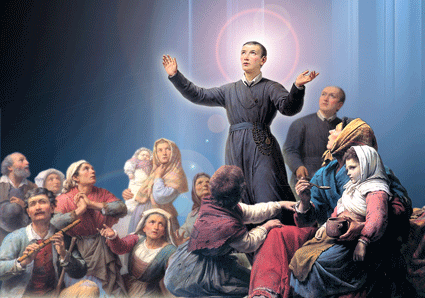
O good Saint Gerard, powerful intercessor before God and Wonderworker of our day, I call upon thee and seek thy aid. Thou who on earth didst always fulfill God’s designs, help me to do the holy Will of God. Beseech the Master of Life, from Whom all paternity proceedeth, to render me fruitful in offspring, that I may raise up children to God in this life and heirs to the Kingdom of His Glory in the world to come. Amen.
For Mother with Child
O almighty and Everlasting God Who through the operation of the Holy Christ, didst prepare the body and soul of the glorious Virgin Mary to be a worthy dwelling place of Thy divine Son; and, through the operation of the same Holy Ghost, didst sanctify Saint John the Baptist, while still in his mother’s womb; hearken to the prayers of Thy humble servant who implore thee, through the intercession of Saint Gerard, to protect her (me); that it may be cleansed by the saving water of baptism and, after a Christian life on earth, it may with its mother, attain everlasting bliss in Heaven. Amen.
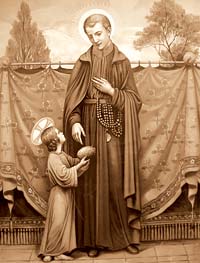 For a Sick Child
For a Sick Child
O Saint Gerard, who, like the Savior, loved children so tenderly and by your prayers freed many from disease and even from death; graciously look down upon the distressed parents who plead with thee for their child’s health if such be the Will, of God. Present their promise to God to bring up the child a good Christian and to guard it by word and example against the fatal leprosy of sin. This favor we implore thee, O sainted Brother, through the tender love with which Jesus and Mary blessed thy own innocent childhood. Amen.
In Time of Trial
O Sainted Brother Gerard, whose heart went out to the unfortunate; who relieved so many poor, healed so many sick, comforted so many afflicted; behold me worried and troubled as I kneel at thy feet. In vain to turn to men to seek consolation and help; therefore, do I have recourse to thee thou who art so powerful in heaven. Graciously assist me, Saint Gerard, that being freed from this trial or strengthened to bear it for the love of God, I may praise and thank God and serve Him with greater love and fervor. Amen.
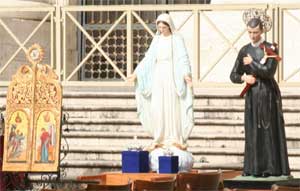 When in Rome, during the Wednesday audience, we saw them bring out a statue of St. Gerard to be blessed by our Holy Father, Pope Benedict. Of course, it would be blessed along with an image of Our Lady. I am sure wherever this statue is now, there are many candles lit requesting this wonderful saints intercession. May all their prayers be answered. St. Gerard Majella, pray for us.
When in Rome, during the Wednesday audience, we saw them bring out a statue of St. Gerard to be blessed by our Holy Father, Pope Benedict. Of course, it would be blessed along with an image of Our Lady. I am sure wherever this statue is now, there are many candles lit requesting this wonderful saints intercession. May all their prayers be answered. St. Gerard Majella, pray for us.
Tags: catholic, catholic podcast, catholic prayer, cathollc spirituality, childbirth, difficult pregnancy, gerard majella, motherhood, mothers, prayer, unwed mothers
This entry was posted on Sunday, October 16th, 2011 at 8:10 am
You can follow any responses to this entry through the RSS 2.0 feed.
[powerpress feed = “devotionals-prayers”]
St. Teresa of Avila was a Carmelite nun and a Spanish mystic. She is also known as “St. Teresa of Jesus” or the “Great St. Teresa” to distinguish her from another Carmelite nun, St. Therese of Lisieux (1873-1897) known as “The Little Flower. St. Teresa of Avila is a very much-loved contemplative Catholic saint
She was Teresa de Cepeda y Ahumada, a child of a noble family, born on March 28, 1515 at Avila in Castile. Her mother died when she was fifteen. This event upset her so much that her father sent her to an Augustinian convent in Avila. Her father brought her home after a year and a half when she became ill. After being exposed to monastic life she wished to become a nun, which her father forbade as long as he was living. At the age or twenty or twenty-one she secretly left home and entered the Incarnation of the Carmelite nuns in Avila, after which her father dropped his opposition.
Much of St. Teresa’s life was plagued by illness. In 1538 it appears she suffered from malaria when her father took her from the convent and placed her under doctors care. Despite of this she remained ill and undertook experimental cures by a woman in the town of Becedas. These methods left her in a coma for three days and not able to walk for three years. It was during this time of illness and convalescence that she took to daily mental prayer, which led to her experiences with mystical prayer. She credited her recovery to St. Joseph.
St. Teresa never sought out the mystical experiences that she experienced, but resigned herself to God’s will and considers the experiences a divine blessing. She spent long hours in meditation that she called the “prayer of quiet” and the “prayer of union.” During such prayers she frequently went into a trance, and at times entered upon mystical flights in which she would feel as if her soul were lifted out of her body. She said ecstasy was like a “detachable death” and her soul became awake to God as never before when the faculties and senses are dead.
St. Teresa being a contemplative is well known for her discussion on the grades of prayer through which the soul is focused upon the love of God passes before reaching the “central mansion” of the soul, where Christ lives. She distinguished sharply between the essence of mysticism, which is loving the contemplation of God infused by God’s own love and grace, and the tangential phenomena that may accompany the contemplative life, such as visions, audible sensations, ecstasy, levitation, and stigmata. She, as others, believed that Satan could manipulate such phenomena to corrupt the gullible even when they come from God. St. Teresa felt that the Devil could twist such things in order to cause the individual to be more concerned with these manifestations than with their true mission of loving God entirely.
Although St. Teresa warned against taking the powers of the Devil too seriously, and advised that his powers should be despised (tener en poco). She said Satan was constantly active against Christians, especially the contemplative, trying intensely to block them from their goal of achieving absolute union with God. Although the Devil was powerless against the defense that Christ builds up in a faithful soul, he will rush in at the person’s weakness moments to suggest things that appear reasonable and good but invariably result in feelings of confusion, worthlessness and disgust. He put for ingeniously devised temptations: he encourages self-righteousness and false humility and discourages us from prayer; he causes us to feel guilty for
having received God’s grace and to labor under the impossible burden of trying to earn it; he makes us ill- tempered toward others; he creates illusions and distractions in the intellect; he inspires the doubt and fear that the understanding that we are granted in contemplation is an illusion. Sometimes we feel that we have lost control of our souls, as if demons are tossing us back and forth like balls. Sometimes we feel that we have made no progress, but even when the boat is becalmed, God is secretly stirring in the sails and moving us along.
In 1562, against opposition, she founded a convent in Avila with stricter rules that those that prevailed in Carmelite monasteries. She was determined to establish a small community that would follow the Carmelite contemplative life, especially unceasing prayer. In 1567 she was given permission to establish other convents, and eventually founded seventeen others. She dedicated herself to reforming the Carmelite order. When St. Teresa was fifty-three she met the twenty-six-year-old St. John of the Cross, who was dedicated to reforming the male Carmelite monasteries. Following a period of turbulence within the Carmelites, from 1575 to 1580, the Discalced Reform was recognized as separate.
As St. Teresa was traveling about Spain founding her reformed Carmelite convents her pen was busy too. All of her books have become spiritual classics. Life, her first work and autobiography written in 1565, describes how she experienced a spiritual marriage with Christ as bridegroom to the soul; she had this experience on November 18, 1572. Following this experience she wrote The Way of Perfection (1573), about the life of prayer. This was followed by The Interior Castle (1577), her best-known work, in which she presents a spiritual doctrine using a castle to symbolize the interior life. This latter book was revealed to her on Trinity Sunday, 1577, in which she saw a crystal globe like a castle that contained seven rooms; the seventh, in the center, held the King of Glory. One approached the center, which represents the Union with God, by going through the other rooms of Humility, Practice of Prayer, Meditation, Quiet, Illumination, and Dark Night.
After founding her last convent at Burgos, in 1582, St. Teresa returned in very poor health to Avila. The difficult journey proved to have been too much for her frail condition. She took to her deathbed upon her arrival at the convent and died three days later on October 4, 1582. The next day the Gregorian Calendar went into effect, thus dropping ten days and making her death on October 14. Her feast day is October 15.
St. Teresa was canonized in 1662 by Pope Gregory XV and was declared doctor of the Church, the first woman so honored, in 1970 by Pope Paul VI – The Mystica
Tags: carmelite nuns, catholic, catholic podcast, catholic prayer, cathollc spirituality, mystic, mystic of the Church, mystical experiences, mystical prayer, st teresa of jesus, st. teresa of avila
This entry was posted on Saturday, October 15th, 2011 at 10:41 pm
You can follow any responses to this entry through the RSS 2.0 feed.
St. Thais is one of the conversion stories just begging for an opera…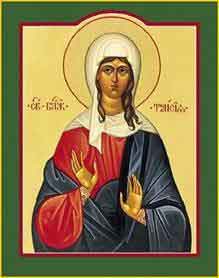 and thanks to Jules Massenet we have one. I couldn’t find any renderings of St. Thais that weren’t (for me) uncomfortably provocative, except for the icon pictured. When you read her life story you know why.
and thanks to Jules Massenet we have one. I couldn’t find any renderings of St. Thais that weren’t (for me) uncomfortably provocative, except for the icon pictured. When you read her life story you know why.
St. Thais lived in Egypt in the fifth century. Left an orphan after the death of her wealthy parents, she led a pious life, distributing her wealth to the poor and giving shelter to pilgrims on her estate. She decided that she would never marry, but would devote her life to serving Christ.
After spending all her inheritance, Thais was tempted to acquire more money by any means and began to lead a sinful life. The Elders of Sketis near Alexandria heard of her fall, and asked St. John the Dwarf to go to Thais and persuade her to repent. “She was kind to us,†they said, “now perhaps we can help her. You, Father, are wise. Go and try to save her soul, and we will pray that the Lord will help you.â€
The Elder went to her home, but Thais’s servant refused to let him into the house. St. John said, “Tell your mistress that I have brought her something very precious.†Knowing that the monks sometimes found pearls at the seashore, Thais told her servant to admit the visitor. St. John sat down and looked her in the face, and then began to weep. Thais asked him why he was crying. “How can I not weep,†he asked, “when you have forsaken your Bridegroom, the Lord Jesus Christ, and are pleasing Satan by your deeds?â€
The Elder’s words pierced the soul of Thais like a fiery arrow, and at once she realized how sinful her present life had become. In fear, she asked him if God would accept the repentance of a sinner like her. St. John replied that the Savior awaited her repentance, and that was why He came, to seek and to save the perishing. “He will welcome you with love,†he said, “and the angels will rejoice over you. As the Savior said Himself, one repentant sinner causes the powers of Heaven to rejoice.†(Luke 15:7).
A feeling of repentance enveloped her, and regarding the Elder’s words as a call from the Lord Himself to return to Him, Thais trembled and thought only of finding the path of salvation. She stood up and left her house without speaking to her servants, and without making any plans for the disposal of her property, so that even St. John was amazed.
Following St. John into the wilderness, she returned to God through penitence and prayer. Night fell, and the Elder prepared a place for Thais to lay down and sleep. He made a pillow for her from the sand, and he went off somewhat farther, going to sleep after his evening prayers.
In the middle of the night, he was awakened by a light coming down from the heavens to the place where Thais was sleeping. In the radiant light, he saw holy angels bearing her soul to Paradise. When he went over to Thais, he found her dead.
St. John prayed and asked God to reveal to him whether Thais had been saved. An angel of God appeared and told him, “Abba John, her one hour of repentance was equal to many years, because she repented with all her soul, and a compunctionate heart.â€
After burying the body of the saint, St. John returned to Sketis and told the monks what had happened. All offered thanks to God for His mercy toward Thais who, like the wise thief, repented in a single moment. – antiochan.org
OK, now in the opera, the monk falls in love with Thais after her conversion, but after her time in the desert, she rebukes him, embrasses heaven…then dies (it’s an opera after all…somebody always dies in the end). “Thais” by Massenet is one of my favorite performances by my FAVORITE soporano, Renee Fleming…I LOVE THIS ENDING (we should all look so could when we pass on). You just have to love those French composers (you’ll probably recognize the melody 5 minutes in) What a way to be commerated…St. Thais, please pray for us
Tags: catholic, catholic podcast, catholic prayer, cathollc spirituality, monks, pious life, repentance, repentant sinner, St. John, Thais
This entry was posted on Saturday, October 8th, 2011 at 8:28 pm
You can follow any responses to this entry through the RSS 2.0 feed.
St. Bruno was one of the most exceptional scholars, teachers, prayer warriors of his time : “…a prudent man whose word was rich in meaning.” I think the key was the gift of great humility. He must have been very close to Our Lady.
: “…a prudent man whose word was rich in meaning.” I think the key was the gift of great humility. He must have been very close to Our Lady.
The Order founded by Bruno — the Carthusians — is one of the strictest in the Church. Carthusians follow the Rule of St. Benedict, but accord it a most austere interpretation; there is perpetual silence and complete abstinence from flesh meat (only bread, legumes, and water are taken for nourishment). Bruno sought to revive the ancient eremitical (hermit)Â way of life. His Order enjoys the distinction of never becoming unfaithful to the spirit of its founder, never needing a reform.
Quote:
Rejoice, my dearest brothers, because you are blessed and because of the bountiful hand of God’s grace upon you. Rejoice, because you have escaped the various dangers and shipwrecks of the stormy world. Rejoice because you have reached the quiet and safe anchorage of a secret harbor. Many wish to come into this port, and many make great efforts to do so, yet do not achieve it. Indeed many, after reaching it, have been thrust out, since it was not granted them from above. By your work you show what you love and what you know. When you observe true obedience with prudence and enthusiasm, it is clear that you wisely pick the most delightful and nourishing fruit of divine Scripture.
~from a letter by Saint Bruno to the Carthusians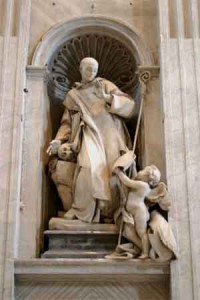
Collect:
Father,
you called St. Bruno to serve you in solitude.
In answer to his prayers
help us to remain faithful to you.
amid the changes of this world.
We ask this through our Lord Jesus Christ, your Son,
who lives and reigns with you and the Holy Spirit,
one God, forever and ever. Amen.
St. Bruno is the patron of diabolic possession. St. Bruno, confessor, ecclesiastical writer, and founder of the Carthusian Order. He was born at Cologne about the year 1030; died October 6, 1101.
Tags: Carthusians, catholic, catholic podcast, catholic prayer, cathollc spirituality, humility, prayer, silence, st bruno
This entry was posted on Thursday, October 6th, 2011 at 8:37 am
You can follow any responses to this entry through the RSS 2.0 feed.
Psalm 23 – Vatican.va
Turning to the Lord in prayer implies a radical act of trust, in the awareness that one is entrusting oneself to God who is good, “merciful and gracious, slow to anger, and abounding in steadfast love and faithfulness†(Ex 34:6-7; Ps 86[85]:15; cf. Joel 2:13; Jon 4:2; Ps 103 [102]:8; 145[144]:8; Neh 9:17). For this reason I would like to reflect with you today on a Psalm that is totally imbued with trust, in which the Psalmist expresses his serene certainty that he is guided and protected, safe from every danger, because the Lord is his Shepherd. It is Psalm 23 [22, according to the Greco-Latin numbering], a text familiar to all and loved by all.
“The Lord is my shepherd, I shall not wantâ€: the beautiful prayer begins with these words, evoking the nomadic environment of sheep-farming and the experience of familiarity between the shepherd and the sheep that make up his little flock. The image calls to mind an atmosphere of trust, intimacy and tenderness: the shepherd knows each one of his sheep and calls them by name; and they follow him because they recognize him and trust in him (cf. Jn 10:2-4).
He tends them, looks after them as precious possessions, ready to defend them, to guarantee their well-being and enable them to live a peaceful life. They can lack nothing as long as the shepherd is with them. The Psalmist refers to this experience by calling God his shepherd and letting God lead him to safe pastures: “He makes me lie down in green pastures. He leads me beside still waters; he restores my soul. He leads me in paths of righteousness for his name’s sake†(Ps 23[22]:2-3).
The vision that unfolds before our eyes is that of green pastures and springs of clear water, oases of peace to which the shepherd leads his flock, symbols of the places of life towards which the Lord leads the Psalmist, who feels like the sheep lying on the grass beside a stream, resting rather than in a state of tension or alarm, peaceful and trusting, because it is a safe place, the water is fresh and the shepherd is watching over them.
And let us not forget here that the scene elicited by the Psalm is set in a land that is largely desert, on which the scorching sun beats down, where the Middle-Eastern semi-nomad shepherd lives with his flock in the parched steppes that surround the villages. Nevertheless the shepherd knows where to find grass and fresh water, essential to life, he can lead the way to oases in which the soul is “restored†and where it is possible to recover strength and new energy to start out afresh on the journey.
As the Psalmist says, God guides him to “green pastures†and “still watersâ€, where everything is superabundant, everything is given in plenty. If the Lord is the Shepherd, even in the desert, a desolate place of death, the certainty of a radical presence of life is not absent, so that he is able to say “I shall not wantâ€. Indeed, the shepherd has at heart the good of his flock, he adapts his own pace and needs to those of his sheep, he walks and lives with them, leading them on paths “of righteousnessâ€, that is, suitable for them, paying attention to their needs and not to his own. The safety of his sheep is a priority for him and he complies with this in leading his flock.
Dear brothers and sisters, if we follow the “Good Shepherd†— no matter how difficult, tortuous or long the pathways of our life may seem, even through spiritual deserts without water and under the scorching sun of rationalism — with the guidance of Christ the Good Shepherd, we too, like the Psalmist, may be sure that we are walking on “paths of righteousness†and that the Lord is leading us, is ever close to us and that we “shall lack nothingâ€. For this reason the Psalmist can declare his calm assurance without doubt or fear: “Even though I walk through the valley of the shadow of death, I fear no evil; for you are with me; your rod and your staff they comfort me†(v. 4). (more…)
Tags: catholic, catholic podcast, catholic prayer, cathollc spirituality, jesus the good shepherd, psalm 23, the Psalmist
This entry was posted on Wednesday, October 5th, 2011 at 3:41 pm
You can follow any responses to this entry through the RSS 2.0 feed.
“Life and Loss in the Shadow of the Holocaust:  A Jewish Family’s Untold Story” is an eloquent telling of a family scattered over three continents by Nazi persecution.  A heroic effort is undertaken by the authors, Rebecca Boehling and Uta Larkey on behalf the children of the generation subjected to the trauma presented in the book, to piece together the collective memory left by the Kaufmann-Steinberg family.  Intriguing, as well as disturbing, this is a book that will stay with you for a long time.  I came away from the read reminded once again never to take even the most ordinary moments in life for granted.[powerpress]
is an eloquent telling of a family scattered over three continents by Nazi persecution.  A heroic effort is undertaken by the authors, Rebecca Boehling and Uta Larkey on behalf the children of the generation subjected to the trauma presented in the book, to piece together the collective memory left by the Kaufmann-Steinberg family.  Intriguing, as well as disturbing, this is a book that will stay with you for a long time.  I came away from the read reminded once again never to take even the most ordinary moments in life for granted.[powerpress]
 Â Â You can find the book here
  You can find the book here
Tags: catholic, catholic podcast, catholic prayer, cathollc spirituality
This entry was posted on Monday, October 3rd, 2011 at 8:49 am
You can follow any responses to this entry through the RSS 2.0 feed.
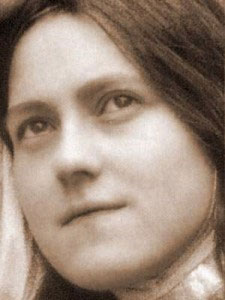 “For me, prayer is a surge of the heart; it is a simple look turned toward heaven, it is a cry of recognition and of love, embracing both trial and joy.” – St. Therese of of Lisieux
“For me, prayer is a surge of the heart; it is a simple look turned toward heaven, it is a cry of recognition and of love, embracing both trial and joy.” – St. Therese of of Lisieux
Sometimes words are not full enough to describe someone.
Therese  is a melody.
A melody of grace lofting lyrically around our hearts in prayer;
a sound which invokes joy and sorrow, smiles and tears,
trust, hope and…love.
I’m not a musician, but I know a beautiful song when I hear it.
Her melody is one you wish never would end,
with Therese, “you hear the song”.
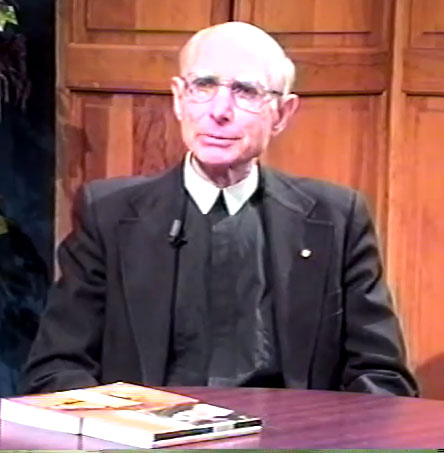 [powerpress]Bruce and I had a chance to speak with Brother Joseph Schmidt about St. Therese. He wrote about her in “Everything is Grace”.
[powerpress]Bruce and I had a chance to speak with Brother Joseph Schmidt about St. Therese. He wrote about her in “Everything is Grace”.
This is my VERY favorite book about St. Therese…it’s wonderful
MY ONLY OCCUPATION IS LOVE
“I do not desire either suffering or death, although both are appealing to me;
it is love alone which really attracts me…
I can ask for nothing with any enthusiasm
except the perfect accomplishment of the Divine Will in my soul,
unhindered by any intrusion of created things.
I can say, with the words of our father, St. John of the Cross,
in his Spiritual Canticle,
‘I drank in the inner cellar of my Beloved, and when I went forth into the meadow
I forgot everything and lost the flock which I used to drive.
My soul has employed all its resources in His service;
now I guard no flock, nor do I have any other duties.
Now my only occupation is love.’
Or again: ‘I know love is so powerful that it can turn
whatever is good or bad in me into profit,
and it can transform my soul into Himself.”
~ St. Thérèse
A MORNING PRAYER WRITTEN BY ST. THERESE
O my God! I offer Thee all my actions of this day for the intentions and for the glory of the Sacred Heart of Jesus. I desire to sanctify every beat of my heart, my every thought, my simplest works, by uniting them to Its infinite merits; and I wish to make reparation for my sins by casting them into the furnace of Its Merciful Love.
O my God! I ask of Thee for myself and for those whom I hold dear, the grace to fulfill perfectly Thy Holy Will, to accept for love of Thee the joys and sorrows of this passing life, so that we may one day be united together in heaven for all Eternity.
Amen.
PRAYER TO ST. THERESE
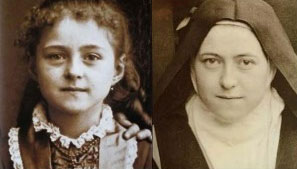 O little St. Theresa of the Child Jesus, who during your short life on earth became a mirror of angelic purity, of love strong as death, and of wholehearted abandonment to God, now that you rejoice in the reward of your virtues, cast a glance of pity on me as I leave all things in your hands. Make my troubles your own – speak a word for me to our Lady Immaculate, whose flower of special love you were – to that Queen of heaven “who smiled on you at the dawn of life.” Beg her as the Queen of the heart of Jesus to obtain for me by her powerful intercession, the grace I yearn for so ardently at this moment, and that she join with it a blessing that may strengthen me during life. Defend me at the hour of death, and lead me straight on to a happy eternity.
O little St. Theresa of the Child Jesus, who during your short life on earth became a mirror of angelic purity, of love strong as death, and of wholehearted abandonment to God, now that you rejoice in the reward of your virtues, cast a glance of pity on me as I leave all things in your hands. Make my troubles your own – speak a word for me to our Lady Immaculate, whose flower of special love you were – to that Queen of heaven “who smiled on you at the dawn of life.” Beg her as the Queen of the heart of Jesus to obtain for me by her powerful intercession, the grace I yearn for so ardently at this moment, and that she join with it a blessing that may strengthen me during life. Defend me at the hour of death, and lead me straight on to a happy eternity.
Amen
Tags: catholic, catholic podcast, catholic prayer, cathollc spirituality, heart, joseph schmidt, joy, love, St. therese little flower, st. therese of lieseux, THERESE
This entry was posted on Saturday, October 1st, 2011 at 12:02 am
You can follow any responses to this entry through the RSS 2.0 feed.
VATICAN CITY, 6 APR 2011 (VIS) – In his general audience in St. Peter’s Square today, attended by more than 10,000 people, Benedict XVI dedicated his catechesis to St. Therese of Lisieux, or St. Therese of the Child Jesus and the Holy Face, “who lived in this world for only twenty-four years at the end of the nineteenth century, leading a very simple and hidden life, but who, after her death and the publication of her writings, became one of the best-known and loved saints”.
“Little Therese“, the Pope continued, “never failed to help the most simple souls, the little ones, the poor and the suffering who prayed to her, but also illuminated all the Church with her profound spiritual doctrine, to the point that the Venerable John Paul II, in 1997, granted her the title of Doctor of the Church … and described her as an ‘expert in scientia amoris’. Therese expressed this science, in which all the truth of the faith is revealed in love, in her autobiography ‘The Story of a Soul’, published a year after her death”.
Therese was born in 1873 in Alencon, France. She was the youngest of the nine children of Louis and Zelie Martin, and was beatified in 2008. Her mother died when she was four years old, and Therese later suffered from a serious nervous disorder from which she recovered in 1886 thanks to what she later described as “the smile of the Virgin”. In 1887 she made a pilgrimage to Rome with her father and sister, where she asked Leo XIII for permission to enter Carmel of Lisieux, at just fifteen years of age. Her wish was granted a year later; however, at the same time her father began to suffer from a serious mental illness, which led Therese to the contemplation of the Holy Face of Christ in his Passion. In 1890 she took her vows. 1896 marked the beginning of a period of great  physical and spiritual suffering, which accompanied her until her death.
physical and spiritual suffering, which accompanied her until her death.
In those moments, “she lived the faith at its most heroic, as the light in the shadows that invade the soul” the Pope said. In this context of suffering, living the greatest love in the littlest things of daily life, the Saint realised her vocation of becoming the love at the heart of the Church”.
She died in the afternoon of 30 September, 1897, uttering the simple words, “My Lord, I love You!”. “These last words are the key to all her doctrine, to her interpretation of the Gospel”, the Pope emphasised. “The act of love, expressed in her final breath, was like the continued breathing of the soul … The words ‘Jesus, I love You’ are at the centre of all her writings”.
St. Therese is “one of the ‘little ones’ of the Gospel who allow themselves to be guided by God, in the depth of His mystery. A guide for all, especially for… theologians. With humility and faith, Therese continually entered the heart of the Scriptures which contain the Mystery of Christ. This reading of the Bible, enriched by the science of love, does not oppose academic science. The ‘science of the saints’, to which she refers on the final page of ‘The Story of a Soul’, is the highest form of science”.
“In the Gospel, Therese discovers above all the Mercy of Jesus … and ‘Trust and Love’ are therefore the end point of her account of her life, two words that, like beacons, illuminated her saintly path, in order to guide others along the same ‘little way of trust and love’, of spiritual childhood. Her trust is like that of a child, entrusting herself to the hands of God, and inseparable from her strong, radical commitment to the true love that is the full giving of oneself”, the Holy Father concluded.
More on St. Therese can be found here
Also click here for a Novena to St. Therese
Tags: catholic, catholic podcast, catholic prayer, cathollc spirituality, doctor of the church, little way, pope benedict xvi, st therese of lisieux, st therese of the child jesus, story of a soul, therese of the child jesus
This entry was posted on Saturday, October 1st, 2011 at 12:01 am
You can follow any responses to this entry through the RSS 2.0 feed.
No surprise to readers and listeners of Discerning Hearts (especially those who follow the teachings of Deacon James Keating)….”Silence is Golden”! Pope Benedict XVI has chosen “Silence and Word” as the theme for World Communication Day.
Deacon James Keating)….”Silence is Golden”! Pope Benedict XVI has chosen “Silence and Word” as the theme for World Communication Day.
Don’t you just love it…earlier we heard from Vatican Radio that the symposium of former theological students of the Holy Father that met with him this past summer reflected on what exactly is meant by the “new evangelizaation”. As reported it ultimately comes down to HUMILITY Â (click here to read and to listen to more on this report).
“Silence and Word” is the path to humility? It works for me!
From Vatican Radio:
[powerpress = Vatican-Radio]
The Pontifical Council for Social Communications on Thursday announced the theme for the 2012 World Communications Day:Â Silence and Word: path of evangelization. Below is the text of a communique from the Council explaining the theme in context:
Statement from the Pontifical Council for Social Communications on the theme for the 2012 World Communications Day
The extra-ordinarily varied nature of the contribution of modern communications to society highlights the need for a value which, on first consideration, might seem to stand in contradistinction to it.
Silence, in fact, is the central theme for the next World Communications Day Message: Silence and Word: path of evangelization. In the thought of Pope Benedict XVI, silence is not presented simply as an antidote to the constant and unstoppable flow of information that characterizes society today but rather as a factor that is necessary for its integration.
Silence, precisely because it favors habits of discernment and reflection, can in fact be seen primarily as a means of welcoming the word. We ought not to think in terms of a dualism, but of the complementary nature of two elements which when they are held in balance serve to enrich the value of communication and which make it a key factor that can serve the new evangelization.
It is clearly the desire of the Holy Father to associate the theme of the next World Communications Day with the celebration of the forthcoming Synod of Bishops which will have as its own theme: The New Evangelization for the Transmission of the Christian Faith.
World Communications Day, the only worldwide celebration called for by the Second Vatican Council (Inter Mirifica, 1963), is celebrated in most countries, on the recommendation of the bishops of the world, on the Sunday before Pentecost (in 2012, May 20).
The Holy Father’s message for World Communications Day is traditionally published in
conjunction with the Memorial of St. Francis de Sales, patron of writers (January 24).
Tags: catholic, catholic podcast, catholic prayer, cathollc spirituality, pope benedict xvi, prayer, silence
This entry was posted on Thursday, September 29th, 2011 at 2:50 pm
You can follow any responses to this entry through the RSS 2.0 feed.
A Prayer to St. Lorenzo Ruiz
Beloved Lorenzo Ruiz, confronted with death, you proclaimed your readiness to die a thousand times for your Christian faith. Today the whole world admires your courage. We feel particularly proud of you as our brother. And we pray: You, a family man, protect our families. Keep them united in love. You, who bore your sufferings with patience and resignation, intercede for the sick of mind and body; help them to receive the grace of God’s miraculous healing. You, who died in a foreign country, take care of Filipinos living and working in this country and in other parts of the world. You, an example of Christian fortitude, sustain our faith and make it spread and grow strong all around us. You, the Philippines’ first saint, be the country’s special protector. Unite us as one people; help us to work in harmony for development and progress; and give us peace. Amen.(State your intentions). San Lorenzo Ruiz, pray for us.  Amen.
Tags: catholic, catholic podcast, catholic prayer, cathollc spirituality, Christian faith, filipino saint, martyrdom, Martyrdom of St. Lorenzo Ruiz, philippines, san lorenzo ruiz, st lorenzo ruiz, St. Lorenzo Ruiz Beloved Lorenzo Ruiz
This entry was posted on Wednesday, September 28th, 2011 at 12:58 am
You can follow any responses to this entry through the RSS 2.0 feed.
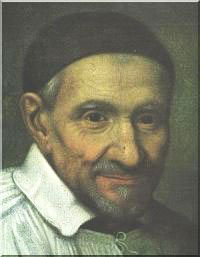 The French priest St. Vincent de Paul (1581-1660) organized works of charity, founded hospitals, and started two Roman Catholic religious orders.
The French priest St. Vincent de Paul (1581-1660) organized works of charity, founded hospitals, and started two Roman Catholic religious orders.
Vincent de Paul was born into a peasant family on April 24, 1581, in the village of Pouy in southwestern France. He became a priest at the age of 19, and would go on to found hospitals, charitable organizations and many other ministries and works that would serve the needs of the poor. With Louise de Marillac, a talented and sensitive friend, he started the first religious group of women dedicated entirely to works of charity outside the cloister, a group called the Daughters of Charity.
Vincent was a man of action rather than of theory. The religious spirit he communicated was simple, practical and straightforward. He looked to Christ as his leader and tried to translate the Gospel message into concrete results. He died on Sept. 27, 1660, and was canonized a saint in the Roman Catholic Church in 1737.
Words of Wisdom
from St. Vincent de Paul
“No matter what others say or do, even if the wicked succeed, do not be troubled: commit everything to God and put your trust in him.â€
“The most powerful weapon to conquer the devil is humility. For, as he does not know at all how to employ it, neither does he know how to defend himself from it.”
“But do you know what it is to labor in charity? It is to labor in God, for God is charity, and it is to labor for God purely and entirely; it is to do so in the grace of God.”
A “Great Hero of Charity”
As reported by Zenit, the Holy Father spoke of St. Vincent de Paul:
The Pope reflected on the Gospel reading from today’s Mass, which recounts the story of the rich man suffering torment, and the poor man Lazarus in the bosom of Abraham.The message of the parable, the Holy Father said, “points out that while we are in this world we must listen to the Lord who speaks to us through the Scriptures and live according to his will, because, after death, it will be too late to make amends.”
“So,” he explained, “this parable tells us two things: The first is that [God] loves the poor and lifts them up from their humiliation; the second is that our eternal destiny is
 conditioned by our attitude; it is up to us to follow the road to life that God has shown us, and this is the road of love, not understood as sentiment but as service to others in the charity of Christ.”
The Bishop of Rome called it a “happy coincidence” that Monday marks the feast of one of the Church’s great heroes of charity, St. Vincent de Paul, patron of Catholic charitable organizations.
“In the France of the 1600s, he touched with his own hand the great contrast between the richest and the poorest,” the Pope said. “[…] Driven by the love of Christ, Vincent de Paul knew how to organize stable forms of service to marginalized persons.”
In fact, the saint founded the first women’s congregation to live their consecration “‘in the world,’ in the midst of the people, with the sick and the needy,” he noted.
The Pontiff added, “Dear friends, only Love with a capital ‘L’ makes for true happiness!” – Zenit
Tags: catholic, catholic podcast, catholic prayer, cathollc spirituality, daughters of charity, st vincent de paul
This entry was posted on Tuesday, September 27th, 2011 at 6:52 am
You can follow any responses to this entry through the RSS 2.0 feed.
Audio Prayer for the intercession of St.Padre Pio[powerpress]
“Pray, pray to the Lord with me, because the whole world needs prayer. And every day, when your heart especially feels the loneliness of life, pray. Pray to the Lord, because even God needs our prayers.”
Tags: catholic, catholic podcast, catholic prayer, cathollc spirituality, mp3 audio pray, mystic, mystic of the Church, padre pio
This entry was posted on Friday, September 23rd, 2011 at 12:01 am
You can follow any responses to this entry through the RSS 2.0 feed.

